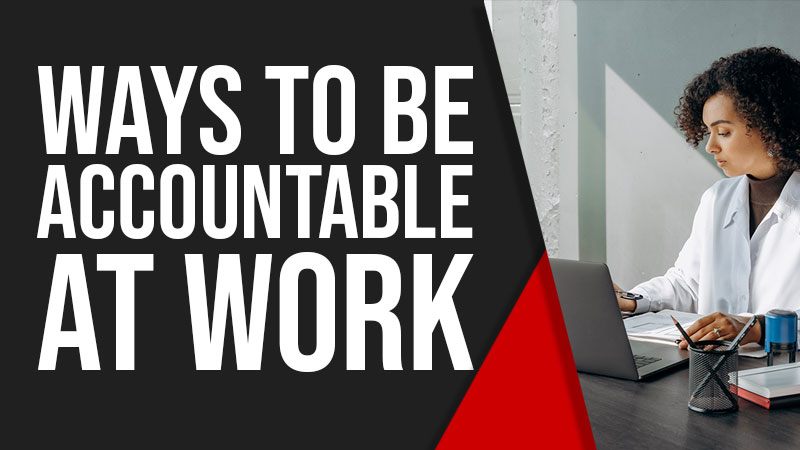Discover 7 Effective Ways to Be Accountable At Work
Share this content :

Do you know the hidden trait that every successful entrepreneur and millionaire uses to win? It’s simple; they all remain accountable. Pioneers like Steve Jobs, Warren Buffett, and John D. Rockefeller understood that they were responsible for the gains and losses of their companies. More importantly, they knew every mistake and victory was their own doing.
Now that you know how they succeeded, you’re probably wondering how you can be accountable. Being accountable can transform your mindset into a productive and effective state. By the end of this page, you’ll find seven effective strategies to be accountable at work.
What it means to be accountable at work
First, you need to understand what accountability at work means. When you remain accountable, it means you take responsibility for your actions. Sounds easy, right? However, it’s not as simple as saying who’s at fault. Have you ever noticed how people can speak without issue about winning an award or trophy? Look carefully, and you’ll see those same people hesitate or stay quiet when they also ruin someone’s plans or hurt somebody’s feelings.
Accountability happens when you accept that you’re responsible for the good and bad things in your life. Using the example above, you should be liable for when you win an award and when you ruin a plan. There’s no exception to the rule here. You can only be genuinely accountable at work when you understand you’re the one in control. Whatever punishments or rewards come your way, you should know if it’s from your behavior. It’s only by accepting what you can control that you understand how to be accountable.

The benefits of accountability at work
Taking responsibility at work is a big step in anyone’s career. Committing yourself to accountability can improve your work ethic and approach problems more efficiently. Here are some advantages you can get when you start to be accountable at work.
You learn better about your work.
You’ll learn what to do and avoid when you take responsibility for your job. Knowledge is essential in any profession, including knowing the right and wrong answers. You might make mistakes from time to time, both minor and major in degree. However, don’t be disheartened. When you take each mistake as a lesson, you can improve your job and streamline your process.
For example, imagine you’re a writer and submitted a manuscript. When you get the draft back, you’ll find multiple notes and comments about your writing style and grammar. It’s easy to feel upset or insulted by someone else’s feedback.
However, remember that the editor is trying to help you do better. The same goes for your supervisor, team leader, or office executive. They all want to help you do your job in an easier and more organized way. Once you take their feedback, you can quickly assess what’s wrong with your approach and how to fix it.
You build trust amongst your colleagues.
Do you remember going to school and working on group projects for class? Then you might recall a member of your team who never seemed to help. Imagine if that person blamed you and your colleagues for poor performance. You’d stop trusting and believing that person.
Once you decide to be accountable at work, you can demonstrate why your colleagues can trust you. For example, you can show them that you are willing to improve as a leader by admitting your mistakes. You might not know how they operate as a department or team. By being candid about what you don’t understand, you show your teammates that you want to help but don’t know how. By showing your honesty, you give your teammates an excellent reason to trust your words.
You plan your actions more efficiently.
When you take responsibility for anything, you’ll be more aware of what actions you plan to take. Anyone can write a report, but being in charge means you’ll want to get it right. You’ll notice that every good leader and visionary intends to ensure their plan is made correctly. Once you take this into heart, you can examine which steps to take on your job.
You can also use these experiences to develop a template of how you approach a project. Perhaps you’ll be a leader who plans everything out, or you’ll be a leader who takes everyone’s suggestions first. Whatever tactic you use, you will find what method you think works best when you choose to be accountable at work.
You boost morale and confidence.
When you become accountable at work, you start to develop your skills as a leader. Your executives and bosses are looking for someone who can take charge and make decisions. Being accountable shows your colleagues and superiors that they can trust you. Accountability helps everyone feel more confident and comfortable about working with you. The more trust you give, the better the morale you inspire. It’s like playing a basketball game; every player can do well, but a responsible coach can plan their actions and motivate them to win. Take that mindset with you when approaching work.

Ways to implement accountability at work
Practicing what you preach, especially regarding being responsible, is essential. Here are seven effective ways you can be accountable at work.
1. Lead by example.
Whether a leader or a team member, your actions reflect amongst your colleagues. How you behave makes a big difference in their attitude and behavior. For this reason, you should remember to lead by example. For example, executives and CEOs always come to work in the appropriate clothes. These people look professional thanks to their suits, dresses, and blazers. Take the same initiative and dress well whenever you go to work. In time, your colleagues will feel inspired to meet your standards.
2. Give feedback and constructive criticism.
Being accountable means you should also hold others responsible for their actions. Make time to go and meet your coworkers to see how their work has progressed. If you see any flaws or errors in their output, point them out. By helping your teammates see their mistakes, you help them improve their skills on the job. Remember to be respectful as you give feedback and comments. As long as you treat them properly, they’ll take your advice to heart and listen to your opinions. This way, your colleagues will also start to be accountable at work.
3. Set clear goals and expectations.
Sometimes, you aren’t accountable at work because you didn’t understand the assignment. You might neglect these responsibilities if you notice any confusion about your job, from quotas to daily reports. Worse, when someone calls you out, you may feel wrongly accused.
Set clear goals and expectations about what you should do to be safe. You should know how your supervisors want the job done as a team member. As a leader, you should elaborate on what your teammates need to do and how they do it. It’s easier to be accountable at work when you know what exactly should be done. To make it easier, outline your plan with the 5 Ws:
- Who – explain who is in charge of which assignment
- What – define what their job is
- When – how soon do you need their outputs, or how long should they work on it
- Where – where will the results go
- Why – why are these tasks important for your plan
4. Openly acknowledge your mistakes and discuss them.
You might want to blame someone else when you make any mistakes at work, from poorly phrased messages to unclear objectives for each plan. However, doing so makes you insincere and dishonest. Instead, take the opposite approach and openly admit your mistakes. Discuss why you messed up and what lesson you learned. It’s essential to show your team that you aren’t perfect and want to do better. Not only does this motivate them to be more honest, but they’ll also feel that they can trust you more.
5. Celebrate your wins, however small.
Being accountable for mistakes is an excellent way to show honesty and build trust. However, you should also take time to hold yourself and others responsible for their victories. Your team must know what you’ve all done right. Take the time to acknowledge everyone’s role in the success of your projects. By recognizing their efforts, you show them that you appreciate their contributions at work.
6. Accept your mistakes and move forward
Have you seen a toddler who realized they made a mistake and started crying about it? Growing up, you probably had days when you kept moping about your errors or slip-ups. However, you can’t take that mentality to work. If you spend time loathing yourself for your actions, you leave less time to move forward. Instead, acknowledge your mistakes and focus on how you can redeem yourself. When you choose to be accountable at work, you also choose to make the most of your errors. Anyone can make mistakes, but you can do better by using them as lessons for your plan.
7. Be considerate to your colleagues.
Accountability at work means knowing there is a reason for every action. You might want to snap or call out your coworkers when they’re late or make mistakes. However, you should remember that they have a reason for doing so. Take time to listen to their motivations and why the behavior continues. Once you know why this keeps happening, shift the conversation to explain how their behavior affects work. Explaining your reasons makes your colleagues aware of the problems without hurting their morale.
Being more understanding to your teammates, you help them feel safe and candid when talking to you.
In summary
Being accountable at work is one of the most sought-after skills. It shows your supervisors and colleagues that you are responsible and honest about your work. Whether success or failure, you should be accountable for the actions and outcome of each plan. By doing so, you build trust amongst your team and learn how to do your job better.
There are several ways you can practice accountability at work. For example, you can ask for and receive constructive comments about your work. You could also take time to discuss your mistakes and how you can curb them openly. Following these tips shows your bosses and teammates that you are a responsible and honest worker. More importantly, you can learn how to do your job with an effective and healthy attitude.

Thank you for reading this article! If you found this helpful, please don’t hesitate to share it with your family and friends. For additional knowledge, you can get a FREE copy of my book, which you can download here. I will share practical tips and tricks on how you can become a millennial millionaire!
Share this content :
Copyright © 2023 Munif Ali. All rights reserved.

